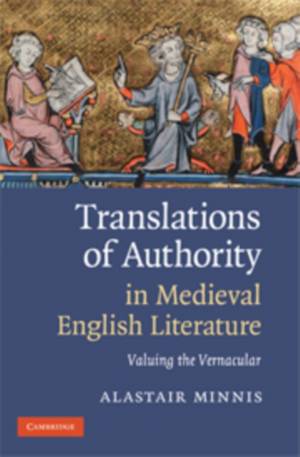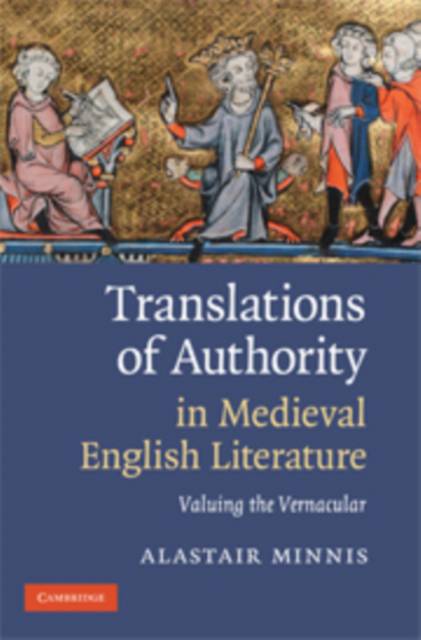
Door een staking bij bpost kan je online bestelling op dit moment iets langer onderweg zijn dan voorzien. Dringend iets nodig? Onze winkels ontvangen jou met open armen!
- Afhalen na 1 uur in een winkel met voorraad
- Gratis thuislevering in België vanaf € 30
- Ruim aanbod met 7 miljoen producten
Door een staking bij bpost kan je online bestelling op dit moment iets langer onderweg zijn dan voorzien. Dringend iets nodig? Onze winkels ontvangen jou met open armen!
- Afhalen na 1 uur in een winkel met voorraad
- Gratis thuislevering in België vanaf € 30
- Ruim aanbod met 7 miljoen producten
Zoeken
Translations of Authority in Medieval English Literature
Valuing the Vernacular
Alastair Minnis
Hardcover | Engels
€ 172,95
+ 345 punten
Uitvoering
Omschrijving
In Translations of Authority in Medieval English Literature, leading critic Alastair Minnis presents the fruits of a long-term engagement with the ways in which crucial ideological issues were deployed in vernacular texts. The concept of the vernacular is seen as possessing a value far beyond the category of language - as encompassing popular beliefs and practices which could either confirm or contest those authorized by church and state institutions. Minnis addresses the crisis for vernacular translation precipitated by the Lollard heresy; the minimal engagement with Nominalism in late fourteenth-century poetry; Langland's views on indulgences; the heretical theology of Walter Brut; Margery Kempe's self-promoting biblical exegesis; and Chaucer's tales of suspicious saints and risible relics. These discussions disclose different aspects of 'vernacularity', enabling a fuller understanding of its complexity and potency.
Specificaties
Betrokkenen
- Auteur(s):
- Uitgeverij:
Inhoud
- Aantal bladzijden:
- 288
- Taal:
- Engels
Eigenschappen
- Productcode (EAN):
- 9780521515948
- Verschijningsdatum:
- 20/04/2009
- Uitvoering:
- Hardcover
- Formaat:
- Genaaid
- Afmetingen:
- 160 mm x 229 mm
- Gewicht:
- 589 g

Alleen bij Standaard Boekhandel
+ 345 punten op je klantenkaart van Standaard Boekhandel
Beoordelingen
We publiceren alleen reviews die voldoen aan de voorwaarden voor reviews. Bekijk onze voorwaarden voor reviews.











